Follow our recap blog below for key highlights and knowledge shared at Automotive Logistics & Supply Chain Digital Strategies North America 2024, which focused on digitalising North America’s end-to-end automotive supply chain. Following the event in Nashville on 26-27 June, we will continue sharing news and features that relate to the speakers and companies involved in the event. Keep following the blog, as we will share videos straight from the main stage and the Red Sofa at the event!
01 August
Our event in Nashville was just over a month ago, but it was so jam-packed with insights that content is still rolling out!
In the latest of our series of Red Sofa interviews from ALSC Digital Strategies North America 2024, in partnership with Vinturas, we interviewed David Herb, Business Insights and Strategy manager, Demand and Supply Management, Toyota North America. Herb spoke about the benefits and opportunities of AI in supply and demand forecasting.
“What we try to do is connect the demand sensing side of the house with supply and inventory, and try to better our planning processes, whether that be through better demand sensing, demand shaping, forecasting, planning, and then how do we actually equip that and execute on that demand with the inventory planning and allocation,” he said.
Herb also spoke on a panel at the event on interoperability, which you can read more on here.
Watch the full Red Sofa interview below.
29th July
For even more content from our Nashville event, May Chang, senior analyst, TechInsights, an attendee at ALSC Digital Strategies North America has rounded up more insight and key takeaways from the event on her blog here.
3rd July
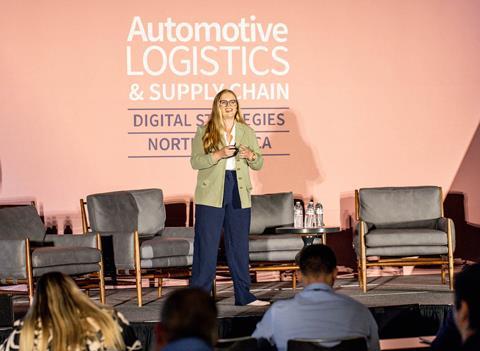
Becca Adam, product line manager for material and vehicle logistics IT at Ford, outlined three guiding principles her department worked on to enable an integrated end-to-end supply chain supported by digital technology.
Adam said it was critical for any large company wanting to succeed as a digitally enabled enterprise to first define a shared vision, then invest in foundational systems and data, and look at the priorities governing that investment, with a focus on the users of logistics and supply chain operations. Companies also need to align their technology roadmap with their talent strategy and communicate continually with the workforce on the shift in ways of working with the new technology.
Investment in foundational systems and data rests on correctly identifying the capabilities technology has to offer. That includes understanding and modernising core value chain execution systems and recognising that data management around those systems underpins their successful application.
Large, complex companies made up of several business units and working at scale across regions need accurate data management to succeed, something Adam said Ford was embracing not just from an integration standpoint, but also in terms of operational real-time visibility.
Adam said that Ford’s partnership with Google Cloud gave it access to large language models (LLMs) that it can integrate with its core data sets as needed. Selling that to business leaders relies on investment in data management, a “foundational investment to future proof the business so that we can fully encapsulate all the value of AI”, she said.
Read more about Becca Adam’s presentation at ALSC Digital Strategies North America
Continuing our series of Red Sofa interviews from ALSC Digital Strategies North America 2024, Ronald Kleijwegt, CEO of Vinturas, a company that specialises in interoperable software applications including blockchain, took to the Red Sofa to speak with Christopher Ludwig, chief content officer, Automotive Logistics about the importance of interoperability.
Watch the interview below.
2nd July
On day two of ALSC Digital Strategies North America, Logan Lytle, supply chain operations technology lead at Honda Development and Manufacturing, said the company has undergone a massive structural reorganisation of supply chain operations across the North American region, establishing a core nucleus and a one team approach, and developing standardised processes and operational responsibilities.
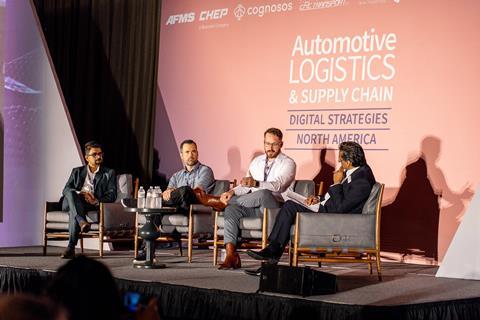
“We defined what wanted from the organisation and we knew we had to get to that point to get interoperability,” said Lytle. “Our associates had to evolve with that.”
Lytle said Honda has established teams for data analytics, technological development and innovation and housed them all under a regional team with specific communication channels and a support structure that manages the operations, including for indirect associates, at each operational site.
What is important in that organisational change is alignment among the parties affected. Alex Murray, senior manager of global supply chain management in the Metal Forming division of American Axle & Manufacturing, said it was important to get everyone on the same page and create a roadmap that everyone can follow.
“If you don’t do that with successful input from everyone, you struggle and it becomes a siloed approach,” he said. “The users that are dealing with the aftermath can be frustrated because it seems to be change that didn’t help them even though potentially it made leadership happy. They end up confused as to why it didn’t go as expected.”
Chandan Trehan, digital supply chains and logistics lead at Bosch North America, said that having a shared definition of organisational change that everyone agreed with was crucial for its success.
“When we are creating that change model it is important to make sure that we are communicating the ‘why’ part of the change more than the how and what part of the it,” he said. Without explaining why a change is happening risks the employees only getting an exercise in compliance rather than feeling they are part of the change, explained Trehan.
Read more about change management and the adoption of digital technology
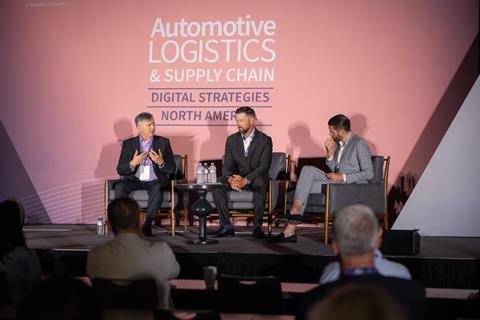
Speaking on the second day at last week’s inaugural Automotive Logistics and Supply Chain Digital Strategies North America conference in Nashville, Tennessee, Ed Stachowski, director of data science and machine learning at Ford, said his Supply Chain Analytics department is getting more requests for machine learning (ML) and artificial intelligence (AI) applications.
That greater demand for provide visibility and prepare for risk has been accelerated by the pandemic disruption and the consequent impact on the semiconductor supply chain.
“Supply chain resiliency became really important through the pandemic and the semiconductor issue,” said Stachowski. “What we did there was an interim containment action, but it has to be broader [in future] and you have to sense that risk through the tiers regardless of what the component might be that could cause disruption.”
The wider adoption of digital tools brings a new layer of complexity as data is sought from across the supply chain and the third-party logistics providers supporting it. For example, there are now a number of examples where digital twin technology is being used in self-contained manufacturing systems but there is more complexity when building a digital supply chain replica that is fed with active data from a variety of sources.
“We have more complexity as we start to look at outside data from third-party vendors and as we start to dive into the tiers,” said Stachowski. “It seems like we have very disparate systems not only in production but in logistics across the different regions, so it is quite complex.”
Scott Sloan, chief architect for the automotive industry at technology firm Kyndryl, agreed.
“When you think about the supply chain and you bring up all the external data it is also about the people and processes, which are much broader,” he said. “To have a consistent strategy that is able to bring all that together [means] the levels of complexity are much greater.”
Automation of processes will help manage the complexity, according to Sloan, and he likened the technological transition to the previous move from mass production to mass customisation.
Read more from the session with Ed Stachowski and Scott Sloan
1st July
While the inagural ALSC Digital Strategies event may be over, the content will keep flowing here in our Recap blog.
In the first of our Red Sofa interviews from ALSC Digital Strategies North America 2024, Skotti Fietsam, senior vice-president, Supply Chain, Accuride took to the Red Sofa in Nashville with Riad Mannan, content producer, Automotive Logistics to talk about the return on investment (ROI) of digital technologies.
Watch the interview below.
27 June
And just like that, it’s time for our final session of the conference!
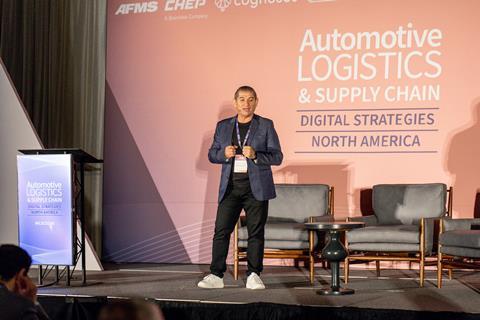
Gerardo de la Torre, regional senior director, Supply Chain Management (SCM), USA & Mexico, Nissan Group of North America – who opened the conference – is back to wrap-up his key takeaways from ALSC Digital Strategies North America 2024.
“It is clear that we are in the process with digitalisation as an industry, and we need to continue to make many decisions about what exactly we need to fine tune,” he says. “I’d like to emphasise again that regulatory requirements will continue to evolve. What I can see is that, in our team, this supply chain compliance group will become much busier, we’ll need many more key partnerships because we cannot survive alone, and we need to continue to demonstrate to the top executives that this future-planning has a payback.”
Rajeev Puri, vice-president & chief technology officer, US Manufacturing & Energy Sectors, Kyndryl says that he sees lots of opportunities in digitalisation in the supply chain when looking ahead ten years.
“Self-learning and the feedback loop could be positive, but the biggest problem that I see is the people and their ability to make decisions, they have to overcome their own learnings about what they accept and don’t accept,” Puri says. “But the appetite to improve and have real time visibility and real time actions is already in the pipeline.”
27 June
This afternoon, we’re talking about a slightly scary topic, looking at cybersecurity in the supply chain and how to mitigate risks from the strongest to the weakest links.
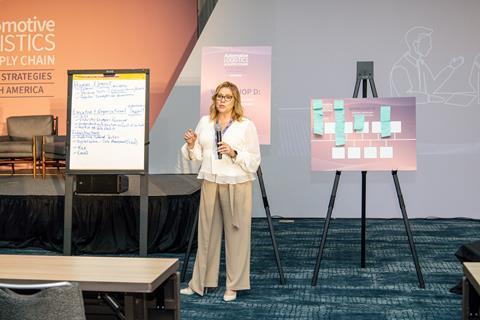
When asked about the importance of cybersecurity in an increasingly digital industry, Jennifer Coulter-Lissman, president & CEO, NTG Supply Chain Solutions says: “It’s mission critical for all of us. For NTG in general, the flow and speed of information is so critical to success that if there is any cybersecurity threat, it is financially impactful for us and also puts our partners at risk.”
She says that in some ways, being a European-owned organisation puts NTG ahead of the curve, as “there is a whole different level of restrictions and requirements for cybersecurity in Europe”. She adds: “We don’t have a choice but to participate at a high level.”
Rick Walker, president & CEO, Georgia Automotive Manufacturers Association (GAMA) says: “There is a new level of threat that’s out there and it’s coming at us pretty fast.”
He says the key first steps to take to improve protection against cybersecurity include making sure staff are educated and aware of the risks and helping them understand the cost of failure. “If you shut down an assembly line on a major OEM, you’re talking losses of more than $100m dollars a day,” he says. “It’s about providing some accountability on that.”
Eric Elliot, senior manager, SCM Supplier Security, Nissan Group of North America says that the recently formed SCM division is beginning to look for a heatmap of companies in the supply chain that may be more vulnerable to attacks.
“We’ve seen that our transportation and logistics suppliers have been ranking a little higher in their cyber hygiene than parts suppliers, but that is from a very small subset so far,” Elliot says. “There are some companies that are better than others, but everybody’s vulnerable. It’s a voyage, there’s not really a finish line because the bad guys are getting smarter. You need to start making incremental changes now, because even those will put you in a better place.”
27 June
Becca Adam, Product Line manager, Material and Vehicle Logistics IT, Ford Motor Company is now on stage to talk about integrating digital products from inbound to vehicle logistics, and from planning to delivery.
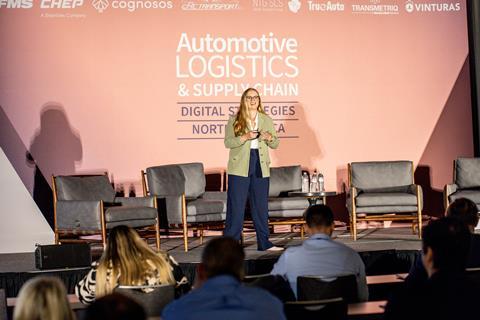
She tells delegates that the first step of integrating digital tools is to define a shared vision. This is done in three stages, she says, starting with having dedicated product management, then creating room to experiment and “fail fast”, and finally through sponsorship from leaders.
To stay aligned in the vision, she says that stakeholders across the supply chain need to be open. “We have to do some modernisation, that’s step number one, and we have to be open to changing our processes, adapting to SAAS and being open to change,” she says. “The next step is understanding it and selling that to leadership, selling the idea that to enable that future vision you do need a significant amount of investment, and it does take time.”
Speaking about some of the main challenges to seamless integration, Scott Mabry, manager, Cross Border Logistics, Volkswagen Group of America says: “The top challenges include making sure that we all understand the same thing, that the data is in a common language. The data needs to mean the same in Mexico as it does in Canada.
“Secondly, there’s the challenge of being able to explain why [changes are being implemented] and be able to express the goals, because that’s what is more beneficial in getting the team together.”
READ OUR FEATURE WITH FORD’S ADAM HERE
27 June
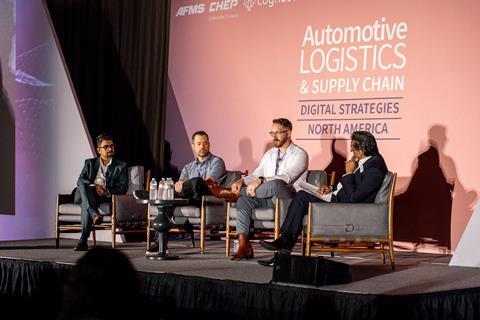
Now on stage we’re joined by Alex Murray, senior manager, Global Supply Chain Management, Metal Forming Division at American Axle & Manufacturing, Chandan Trehan, lead, Digital Supply Chains and Logistics at Bosch North America, and Logen Lytle, Operations Technology lead at Honda – and they’re talking about how digital transformation and organisational change go hand-in-hand.
Promoting a culture of innovation is imperative for transformation, according to American Axle’s Murray. “There is a level of failing that’s necessary, and it’s okay to fail but you have to fail fast, if you have an idea you have to try, fail fast and get back on course,” he says. “Allowing that failure to happen puts a person in a spot where they’re more willing to be innovative and adapt that idea with others and see how we can move it forward.”
He adds: “A person that is really tied to the current process or way it is down the oftentimes let pride get in the way. If you’re unwilling to put your pride to the side and accept there may be a new or better option, you squash innovation from the start.”
Honda’s Lytle agrees, stressing that it also needs to be the norm to reach out for help from a third-party partner when needed. “We have 101 gates that prevent certain things from happening, in order to minismise risk, and as we move into larger scale digitalisation and digital changes, it’s not something we’re overly comfortable with,” he says. “We lean pretty heavily on the existing strategic partnership we have, to understand things all the way down to granular levels, so we can understand the same message. If it’s low hanging fruit we would’ve done it 30 years ago, so we need help on that. That’s something we learned the hard way.”
27 June
Overcoming integration and interoperability challenges across the end-to-end value chain is a difficult area for OEMs and suppliers alike, and our panel this morning is discussing how to make it easier and more beneficial for all parties involved.
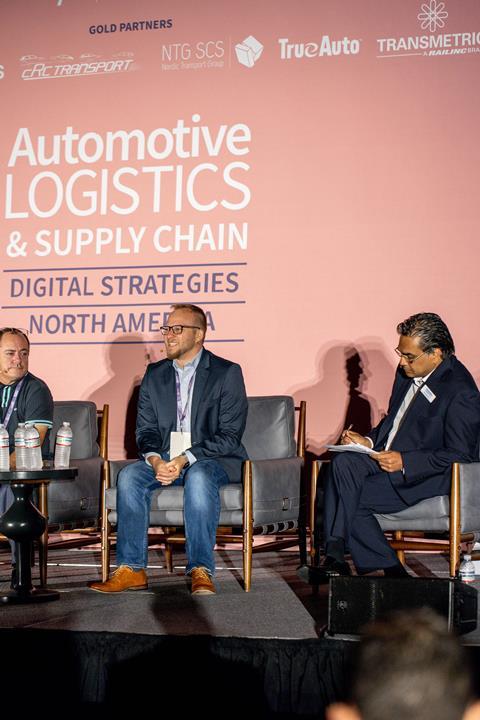
David Herb, Business Insight and Strategy manager, Demand and Supply Management, Toyota North America says that the reason integration of systems is so important is to gain a seamless user experience, alkthought trying to uplift and modernise the entirety of the supply chains’ systems and softwares is a daunting task.
Herb says the solution lies in communication. “Talk to your stakeholders, stop the excel jocking across email, and build that trust,” he says. “At Toyota, we go look, go see, go understand the process.”
He adds that interoperability is a “two-way street”.
“If we’re not making it easier for [partners] to see how we’re using data or to communicate what is needed to us, we’ve lost,” he says. “Traditionally, we set. Sales plan and send it all the way down to our suppliers, but that disregards risks and opportunities. We need to ask how we can be better about transmitting those risks and lead times transparently, so that the tier-1s and tier-2s aren’t trying to scramble and save money.”
David Eyes, vice-president of Automotive Solutions, TrueCommerce agrees. “The first thing we have to do is make it a win-win process,” he says. “We have to bring common standards [in systems] up to the modern day. It has to start with the customer, because if their data is incorrect then my data is incorrect. We have to have trust with the OEM that they are going to respect the business information and supply and demand that we have agreed upon.”
27 June
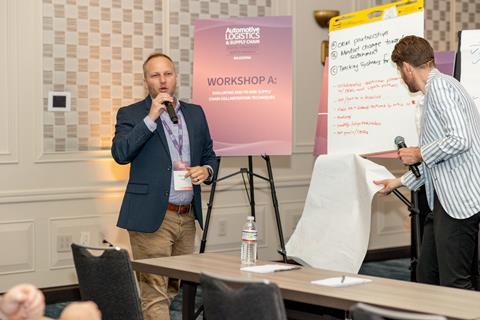
Yesterday, we split into breakout sessions to discuss the challenges and opportunities we are seeing in digitalisation in the supply chain. David Herb, Business Insights & Strategy manager, Demand & Supply Management, Toyota North America (who will be speaking later today), led the group discussing weaving sustainability into your digitalisation strategy.
Herb spoke about the three key pillars of sustainability across environmental, people and technological sustainability, and with the delegates in the room planned out a roadmap to achieve goals with accountability. The workshop found that the top priorities for the industry are measuring impact and having dates to achieve goals, changing the culture from the top down to attract and retain talent, balancing risks and prioritising the greater good versus profit through partnerships.
As for next steps, the group agreed that a three year timeline would be realistic to achieve next steps including ranking efficiencies with stakeholders, putting together a timeline for implementations, and setting accountability strategies.
27 June
Welcome to day two of the ALSC Digital Strategies North America conference 2024! We are excited to kick off another day packed with engaging sessions and insightful discussions. Today’s agenda is focused on leveraging data for hyper-value, overcoming integration challenges, and exploring digital transformation in the automotive supply chain.
Starting with a session on driving actionable insights from data, we will delve into the intricacies of system interoperability and the essential skills needed for a digitally agile workforce.
Key industry leaders from Ford, Kyndryl, Toyota and more will share their expertise on harnessing the power of data and digital integration. Don’t miss the session with Becca Adam from Ford, who will explore opportunities and gaps in core systems for vehicle logistics. The sessions will highlight practical strategies and real-world case studies, offering valuable lessons on creating resilient and efficient supply chains.
As we progress through the day, we’ll explore the integration of digital products in logistics, measure ROI from digital transformation, and tackle cybersecurity threats in the supply chain. With insightful contributions from experts at Volkswagen, Cognosos, Nissan, and other leading organisations, today promises to be both informative and inspiring. Stay tuned for live updates and key takeaways throughout the day!
26 June
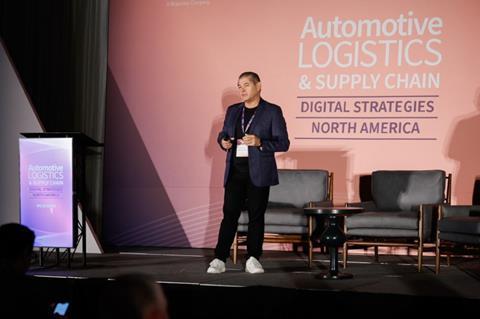
Gerardo de la Torre, regional senior director, Supply Chain Management (SCM) USA & Mexico, Nissan Group of North America is the first keynote speaker and has set the tone for what the whole conference will discuss, from talent and training in digitalisation, to cybersecurity, adhering to regulations and responding to, and being proactive about, supply chain disruptions.
Nissan has been focusing on digital innovation and cybersecurity through its Supply Chain Management division, having restructured the team and having recently named KPMG as its strategic partner for the Manufacturing Cybersecurity Supplier Program (MCSP). In just one year since the launch of MCSP, Nissan has gone from having assessed 30 suppliers to 60 and is aiming for 80 within this year.
The OEM also partnered with PwC to develop and launch its tier-n solicitation application, launched just last month, which is regionally focused with plans for global adoption across the carmaker.
“PwC was selected as best potential partner as it was already involved with us in our USMCA requirements,” says De la Torre. “PwC is already embedded in our collaborations with our suppliers. We’re making sure that every single box is standardised, and we are now able to create our own tier-n sourcing supply maps, so now we can show the authorities we comply. Our new interface will also support proactive risk identification.”
26 June
We have officially kicked off Automotive Logistics & Supply Chain Digital Strategies North America in Nashville!
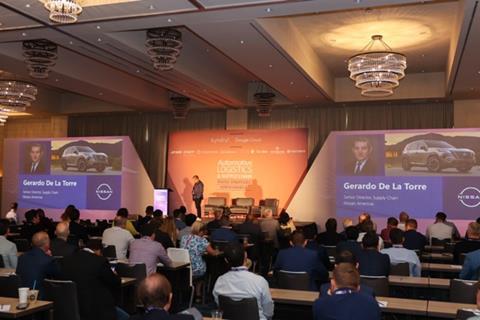
To begin the conference, delegates were asked in which area they would expect to gain the most benefits in supply chain logistics over the next three years.
In response, almost half (42%) said that real-time visibility would bring the most benefits, while 23% said data analytics would be most advantageous in the short-term. Just 6% of delegates said generative AI would bring benefits in the next three years, with the remaining delegates splitting votes across advanced automation (12%), machine learning and AI (9%), and simulation modelling (8%).
We will be collecting similar data and insight from the industry in our Automotive Logistics Systems and Software Survey 2024, which you can contribute to here.
26 June
Welcome to Day 1 of the Automotive Logistics & Supply Chain Digital Strategies North America 2024!
We are kicking off this year’s conference with the opening day dedicated to exploring the world of automotive logistics and digital supply chain innovations.
Here’s what to expect:
-
Session 1: Digital Supply Chain Leadership Strategies: As the automotive industry rapidly evolves in North America, with shifts towards electrified and software-defined vehicles under economic pressures, the upcoming ALSC Digital Strategies North America conference will focus on radical innovations in supply chain management. The first session session will feature insights from industry leaders like Nissan’s Gerardo de la Torre and and Luis Solano from Google Cloud, discussing transformations in supply chain dynamics, from cloud-based IT advancements to cybersecurity and digital infrastructure.
-
Interactive Standing Workshops: The session will be followed by a series of workshops designed to delve deeper into topics such as end-to-end collaboration, data exchange, cross-functional teams, cybersecurity, and ROI. Participants will join five focused groups, led by experts inclusing David Herb from Toyota, Logan Lytle from Honda, William Leak from Nissan, Jennifer Coulter-Lissman from NTG Supply Chain Solutions and Alex Murray from American Axle & Manufacturing to explore these topics deeply, discussing challenges, devising solutions, and formulating actionable roadmaps.
Day 1 promises to be a blend of thought leadership, practical insights, and peer-to-peer learning with ample opportunities to network and discuss future trends in automotive logistics. Stay tuned for more live updates from the main stage!
You can still register to view the event online in case you cannot make it to Nashville!
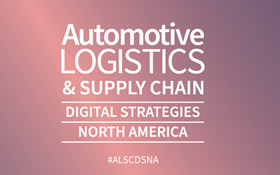
25 June
It’s almost time for kick off!
The first Automotive Logistics and Supply Chain Digital Strategies North America conference begins tomorrow in Nashville, and will feature discussions about how to accurately and securely share data throughout the sector. Sharing data and knowledge is essential for automotive logistics to use digitalisation to its full advantage, but there is still a reluctance to trust other parties with sensitive data and information.
Gerardo de la Torre from Nissan Group of North America and Luis Solano from Google Cloud will kick off the conference tomorrow by discussing why trusted partnerships are needed to create end-to-end visibility, connectivity, traceability, automation and security in logistics.
Previously, leaders from Ford, Subaru, VW and more spoke about why it’s necessary to break the status quo and democratise data to see effective results.
Read the full feature on democratising data and enabling transparency here
24 June
Ricardo Manzanera, Americas Purchasing Logistics, Transport director at Forvia will take to the stage on day two of the conference to discuss how stakeholders are increasing interoperability and exchange of data across suppliers, logistics providers and customers through trusted networks and shared standards.
The tier one parts supplier has been using the latest digital technology to manage its supply chain and mitigate disruption, while maintaining close communication with its logistics providers. Manzanera previously told Automotive Logistics that Forvia has a “deep-trust approach” with an approved panel of carriers that the company does business with. “These carriers have the right strategy, technology and a partnership mentality to support the seamless flow of parts,” he added.
Read the full feature with Forvia’s Ricardo Manzanera here
21 June
As the automotive industry’s supply chain faces growing complexity and uncertainty, OEMs, suppliers, and logistics and technology providers are accelerating their adoption of digitalisation and software integration. This shift aims to improve cost-effectiveness, efficiency, network design, capacity, risk management, and visibility, while also capitalising on data analytics, machine learning, and AI.
However, challenges like legacy systems, limited interoperability, inadequate data strategies, skills shortages, and insufficient investment often hinder the full potential of digitalisation in automotive logistics.
To better understand the landscape, we have launched the Automotive Logistics Systems and Software Survey 2024 to leverage our global expert audience and gain insight into the challenges, opportunities, and outlook for automotive logistics systems and software.
Click here to take part in the survey
It will take you 5-10 minutes and the responses will be anonymous. Thank you!
21 June
One of the key topics of the conference will be cyber security, which will be discussed in the opening and closing keynotes – and plenty in between, too.
Everstream Analytics’s report at the beginning of the year found that the risk of cyberattacks on the automotive industry will remain high in 2024, and said that cyberattacks on supply chains rose sharply during 2023, up 202% year-on-year. This is the highest level in the last five years, surpassing the previous record during the Covid-19 pandemic in 2020, and the analytics firm said it is not slowing down.
In 2023, cyberattacks primarily hit the logistics sector, including trucking firms, ocean carriers, rail companies and airlines, accounting for a total 17% of attacks across all industries. The automotive industry accounted for a tenth of all cyberattacks across all sectors and carmakers were not exempt from the impact.
On 26th, Jennifer Coulter-Lissman, president & CEO at NTG Supply Chain Solutions will conduct a workshop along with the attendies to evaluate the characteristics and effects of cyberattacks within the supply chain, discuss strategies for safeguarding the value chain whilst fostering partnership and information sharing, among other key areas. We will then have a session with Eric Elliot, who is leading the SCM supplier security at Nissan Group of North America where he will talk about plans to mitigate systems, suppliers and employees from rising cyber risks and threats along with Jennifer and Rick Walker, president & CEO at GAMA – Georgia Automotive Manufacturers Association.
You can still register to view the event online incase you cannot make it to Nashville!
20 June
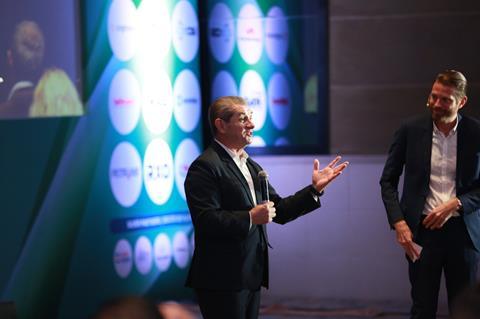
The opening panel of Automotive Logistics & Supply Chain Digital Strategies North America 2024 will be led by Gerardo de la Torre, regional senior director, Supply Chain Management (SCM) USA and Mexico, Nissan Group of North America.
De la Torre is set to discuss how manufacturers are evolving the supply chain IT landscape to clooud-based systems for more efficient, proactive and resilient logistics with innovative digital supply chain mapping solutions to meet sourcing and regulatory requirements, digital tiwns and AI, and automoation opportunities in logistics operations and processes. Joined for a discussion with Luis Solano, mgeranufacturing industry lead at Google Cloud, the pair will also discuss cyber security risk assessment strategies across the supply chain.
Nissan created a cyber security team within its logistics division over the last 18 months, something De la Torre’s counterpart Eric Elliot, senior manager, SCM Supplier Security at Nissan Group of North America will also discuss on day two of the conference.
Watch: Nissan’s Chris Styles, VP of SCM, discusses technological evolution on the Red Sofa
19 June
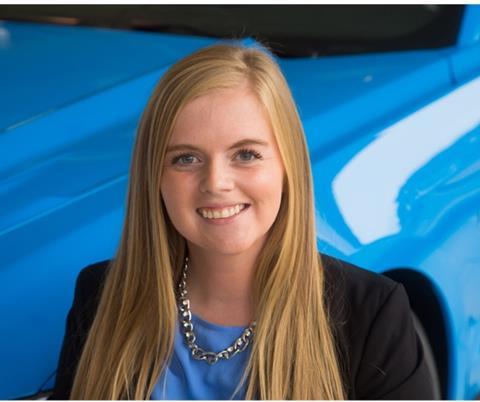
As we begin the countdown to Automotive Logistics & Supply Chain Digital Strategies North America 2024, taking place in Hutton Hotel, Nashville from 26-27 June, Automotive Logistics will share news and features that will tie into discussions on the main stage and feature some of the experts that will speak at the event, keeping you in the loop and armed with topics to discuss during networking in Tennessee.
During the second day of the event, delegates will hear from Becca Adam, product line manager, Material and Vehicle Logistics IT at Ford Motor Company as part of a panel discussing integrating digital products, from inboud to vehicle logistics and planning to delivery. Adam, who will be joined onstage by experts from VW Group of America, Cognosos and TransmetriQ, will discuss the importance of aligning talent, vision and strategy in digitalisation and AI implementation. She is set to elaborate on defining a shared vision between IT and logistics divisions, focusing on foundational data management, and preparing for AI implementation across the supply chain.
Three years ago, Ford began its technology transition to a product delivery model (PDO), where IT ownership is grouped by business function globally. Adam’s Material and Vehicle Logistics iT team oversees inbound material and vehicle logistics systems, a function that is focused on building and delivering Ford’s vehicles.
Adam recently spoke to Automotive Logistics about closing the digital divide at Ford, implementing digital twin concepts for inbound material flow, integration of real-time location services into transport and yard management, and the focus on data management in logistics.
“When this technology was being introduced as the next big thing there were still a lot of elements to how value was going to be fully realised that we were missing,” Adam toldAutomotive Logistcs. “We were talking about it as a visibility platform but now we have to find the value in execution.”
Read the full feature with Ford’s Adam here
Last month, Ford’s vehicle logistics planning manager for North American vehicle logistics, Paul Roosen, spoke at Finished Vehicle Logistics North America 2024 about the importance of democratising data when digitalising the supply chain, which you can also read about here.

Automotive Logistics & Supply Chain Digital Strategies North America 2024 takes place 26-27 June 2024 in Hutton Hotel, Nashville, Tennessee.
At the event, experts will discuss the development of electrified and software-defined vehicles, and how increasing competition is leading to a radical rethink of the very nature of suplpy chains and logistics, including how supply chains are designed and managed, and the technology and digital infrastructure supporting them.
Register to attend ALSC Digital Strategies North America h S
Topics
- AI & Predictive Analytics
- Air Freight
- ALSC DS NA 24
- American Axle
- Bosch
- Canada
- Cross-Border Logistics
- Cybersecurity
- Data Integration & Interoperability
- Digitalisation
- Editor's pick
- features
- Finished Vehicle Logistics
- Ford
- Forvia
- Honda
- Inbound Logistics
- Inventory management
- Logistics service provider
- Mexico
- Nearshoring
- News
- Nissan
- North America
- OEMs
- People
- Plant Logistics
- Policy and regulation
- Ports and processors
- Rail
- Real time location
- Road
- Shipping
- Suppliers
- Supply Chain Planning
- Sustainability
- Technology service providers
- Telematics
- Top stories
- Toyota
- Track-and-trace
- United States Of America
- Volkswagen


























![Global[1]](https://d3n5uof8vony13.cloudfront.net/Pictures/web/a/d/s/global1_726550.svgz)




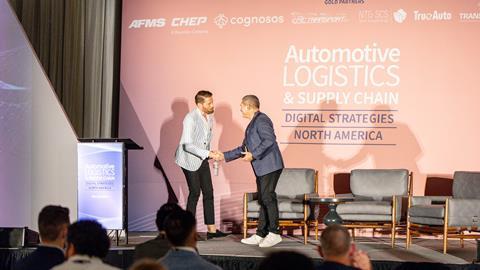

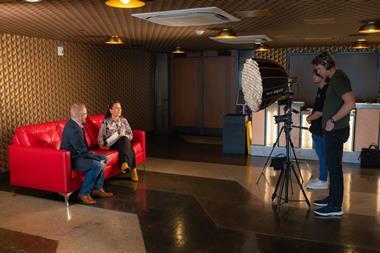
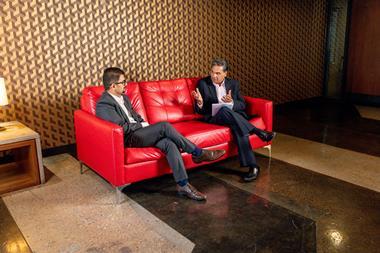
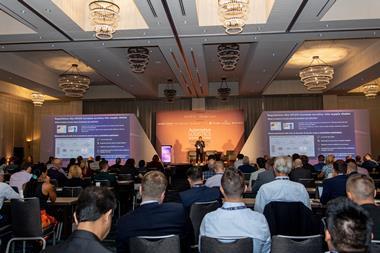
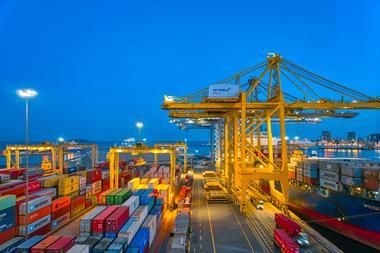




No comments yet